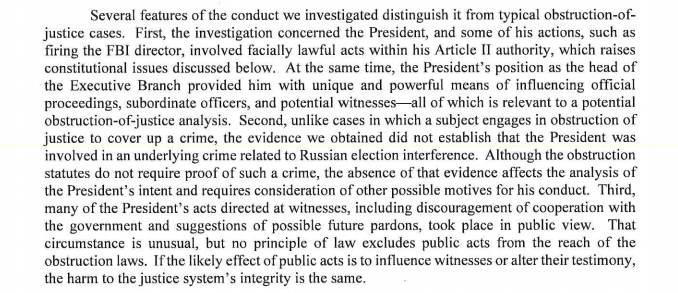StringerBell
OG
https://talkingpointsmemo.com/news/...ten-interview-inadequate-elected-not-subpoena
Mueller Called Trump Written Interview ‘Inadequate,’ But Opted Not To Subpoena
Special counsel Robert Mueller’s team was not pleased with the written interview that President Trump gave in response to their questions, but elected not to subpoena him to avoid drawing out the investigation.
According to Mueller’s report, Trump stated on more than 30 occasions that he did not “recall” or “remember” or have an “independent recollection” of the information requested of him. The Mueller team described the responses as “inadequate” and again requested an in-person interview with Trump. The President declined.
From the report:
“Recognizing that the President would not be interviewed voluntarily, we considered whether to issue a subpoena for his testimony. We viewed the written answers to be inadequate. But at that point, our investigation had made significant progress and had produced substantial evidence for our report. We thus weighed the costs of potentially lengthy constitutional litigation, with resulting delay in finishing our investigation against the anticipated benefits for our investigation and report”
“We determined that the substantial quantity of information we had obtained from other sources allowed us to draw relevant factual conclusions on intent and credibility, we are often inferred from circumstantial evidence and assessed without direct testimony from the subject of the investigation.”
Mueller’s team negotiated with Trump lawyers for months to try to land an in-person interview with the President on an agreed upon set of topics. Ultimately, prosecutors sent Trump questions related to the June 9, 2016 Trump Tower meeting, Russian hacking efforts, WikiLeaks, the Trump Tower Moscow project and contacts with Russia during and after the campaign.










